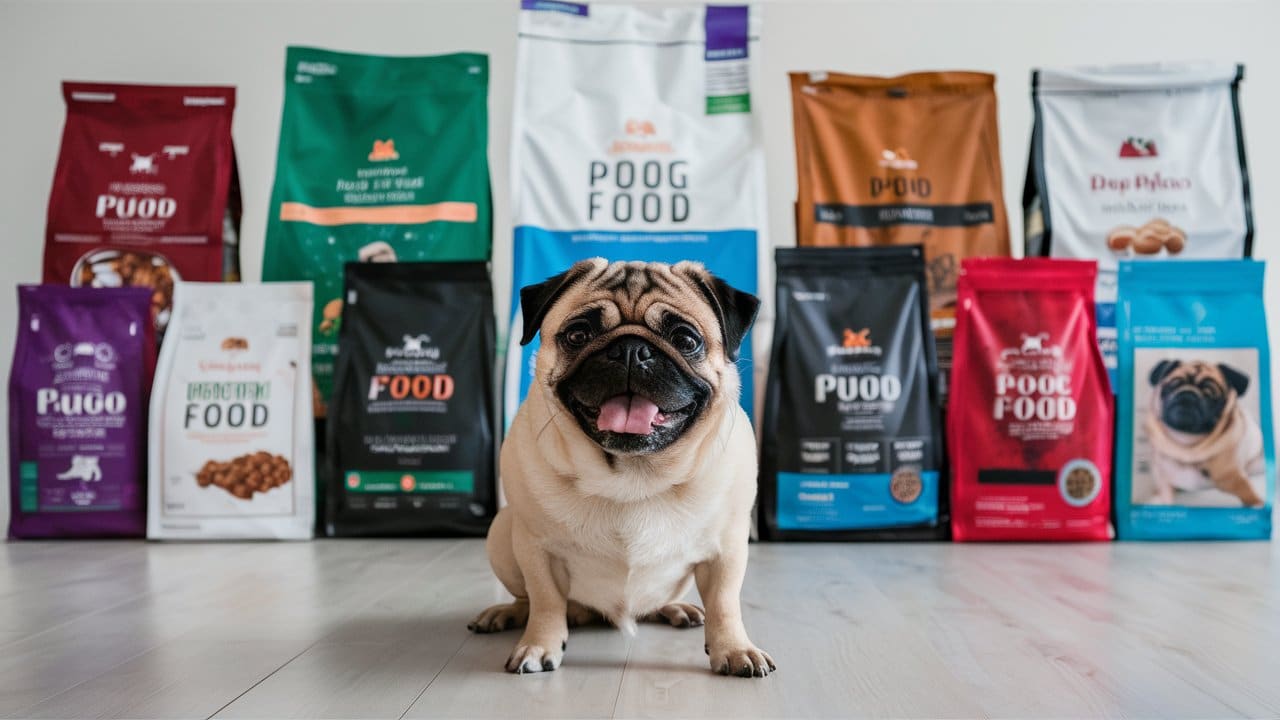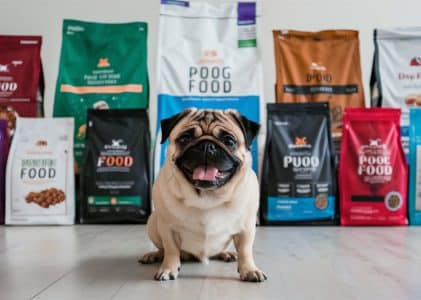You know the look. Dinnertime rolls around, you plop down their usual kibble with a flourish, and…nothing. They stare at the bowl with all the enthusiasm of a wet sock, then nudge it with a disdainful sniff before giving you the full-on pug side-eye.
Finding the right food for our flat-faced friends can feel like a never-ending quest. Pugs, for all their adorable smushiness, are notorious connoisseurs of their kibble kingdom.
I’ve looked into the world of wet food for pugs, and let me tell you, there’s a whole world of delicious and nutritious options waiting to be explored. Options that might just turn that grumpy glare into a tail-wagging frenzy.
So, grab a drink, get comfy, and let’s discover the best wet food to keep your pug happy and healthy!
Check out our best dog food for pugs review page by clicking here….
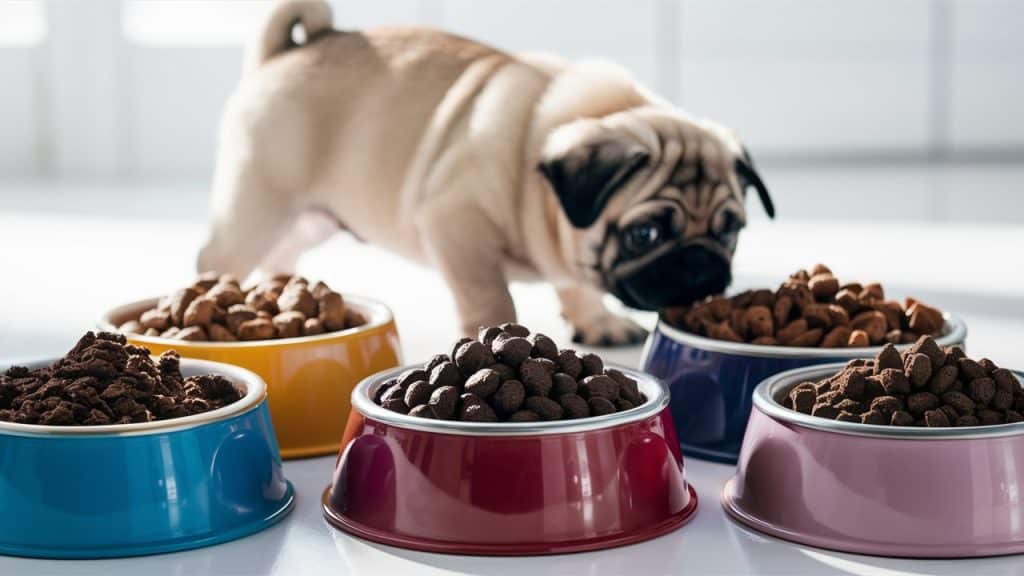
Best dog food for Pugs
Pugs, with their unique needs, require careful consideration when it comes to nutrition. From smaller kibble sizes to omega-3 fatty acids for skin health, selecting the best dog food plays a crucial role in their happiness and longevity.
Explore various options like kibble, wet food, or raw diets, keeping in mind your Pug’s preferences and consulting your vet for personalized recommendations if needed. Investing in the right food is key to a healthy and playful life for your beloved Pug.
Key Takeaways:
- Special Considerations: Pugs, with their adorable smooshed faces, require smaller kibble sizes to eat comfortably. Look for nutrient-rich food with calorie control and omega-3 fatty acids to support weight management and healthy skin.
- Food Options: When choosing dog food for your Pug, consider kibble for convenience, wet food for higher moisture content, or raw food diets for a more natural approach. Consult your vet to determine the best option for your furry friend.
- Healthy Foundation: Your Pug’s long-term health and happiness depend on the right food. Vet-recommended brands with high-quality ingredients and balanced nutrition are ideal. A nutritious diet is the key to a playful and thriving Pug!
Understanding Your Pug’s Nutritional Needs
Pugs have spent thousands of years as beloved companions to royalty from China to Holland and beyond, yet somehow these regal dogs have maintained their sweet, humble spirit as well as their happy-go-lucky demeanor. Best of all, they’re equally content whether you live in an apartment or reign in a castle. You’ll definitely feel like royalty with a Pug in your life—the tiara is optional.
https://be.chewy.com
Unique Characteristics of Pugs
For Pugs, their adorable smooshed faces make them stand out, but these unique features also affect how they eat. With their short snouts, smaller kibble sizes are a must to make mealtime easier for them.
Dietary Requirements for Optimal Health
On top of their special needs, Pugs benefit from nutrient-rich food that supports weight management and healthy skin. Look for dog food formulated with calorie control and omega-3 fatty acids to keep them in top shape.
Plus, managing their skin allergies is crucial. Allergies are a common concern for Pugs, so feeding them the right food can play a significant role in keeping their skin healthy and itch-free.
Managing Skin Allergies through Nutrition
Allergies can be a problem for Pugs, but the right diet can help. By choosing dog food with high-quality ingredients and balanced nutrition, you can help manage your Pug’s skin allergies effectively.
Dietary choices can make a huge difference in your Pug’s overall well-being. By understanding their unique needs and selecting the best dog food for Pugs, you can ensure your furry friend stays happy and healthy for years to come.
Types of Dog Food for Pugs
Little ones come in all shapes and sizes. The Kibble: Convenience and Shelf-Stability, Wet Food: Higher Moisture Content for Healthy Digestion, and Raw Food Diets: Pros and Cons for Pug Owners are a few different options owners can offer their Pugs. Each has its own advantages and considerations.
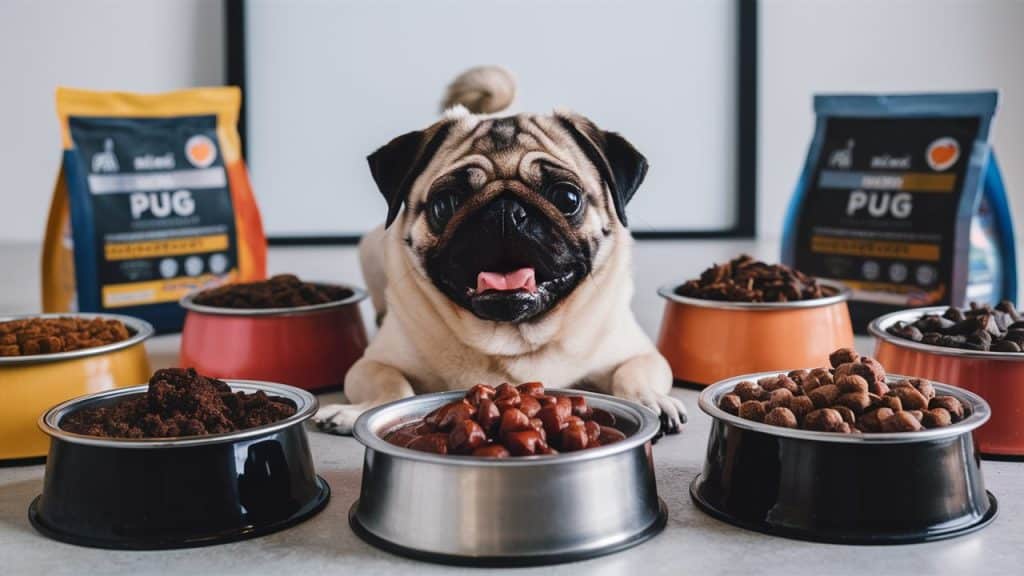
Kibble: Convenience and Shelf-Stability
The convenience and shelf-stability of kibble make it a popular choice for many Pug owners. Made with smaller kibble sizes to suit their adorable smooshed faces, kibble is easy to portion and store. With options formulated for weight management and skin health, this type of dog food can be a convenient and nutritious choice for your Puggy pal.
Wet Food: Higher Moisture Content for Healthy Digestion
Types of dog food for Pugs, like wet food, offer higher moisture content that can aid in healthy digestion. Some Pugs may find wet food more appealing due to its texture and taste. By providing additional hydration, wet food can be a beneficial option for Pugs with specific dietary preferences or needs.
Plus, wet food is available in a variety of flavors and options, allowing owners to find the best fit for their Pug’s palate. It’s vital to consider your Pug’s individual preferences and consult with your veterinarian to determine if wet food is the right choice for your furry friend.
Raw Food Diets: Pros and Cons for Pug Owners
With more and more pet owners considering raw food diets for their Pugs, it’s crucial to weigh the pros and cons before making the switch. While raw food diets offer a more natural approach to feeding, they require careful planning and safe handling practices.
Raw food diets can provide various health benefits, including improved digestion, healthier skin, and coat quality. However, there are potential drawbacks, such as the risk of bacterial contamination and nutrient deficiencies.
Digestion is a critical consideration when exploring raw food diets for Pugs. While some may thrive on this diet, others may experience digestive issues or nutrient imbalances. Consulting with your veterinarian and carefully monitoring your Pug’s health and well-being is vital when transitioning to a raw food diet.
Make an informed decision based on your Pug’s individual needs and preferences. Recall, their health and happiness are the top priorities when selecting the best dog food for your beloved Pug.
Personalized Recommendations for Your Pug
With your vet’s expertise, you can tailor your Pug’s diet to ensure optimal health and happiness. Consider factors like calorie control, omega-3 fatty acids, and nutrient-rich ingredients to support your Pug’s overall well-being.
Factors to Consider Beyond Veterinarian Input
When choosing the best dog food for your Pug, consider factors beyond your veterinarian’s recommendations. Consider brand reputation, price, and carefully reading dog food labels to ensure you’re making the right choice. After all, your Pug’s health and happiness depend on the fuel you provide.
With the variety of dog food options available, it’s crucial to make an informed decision regarding what goes into your Pug’s bowl. Input from your veterinarian is beneficial but remember to consider all aspects to find the best fit for your furry friend. After all, a happy Pug is a healthy Pug!
Evaluating Dog Food Options
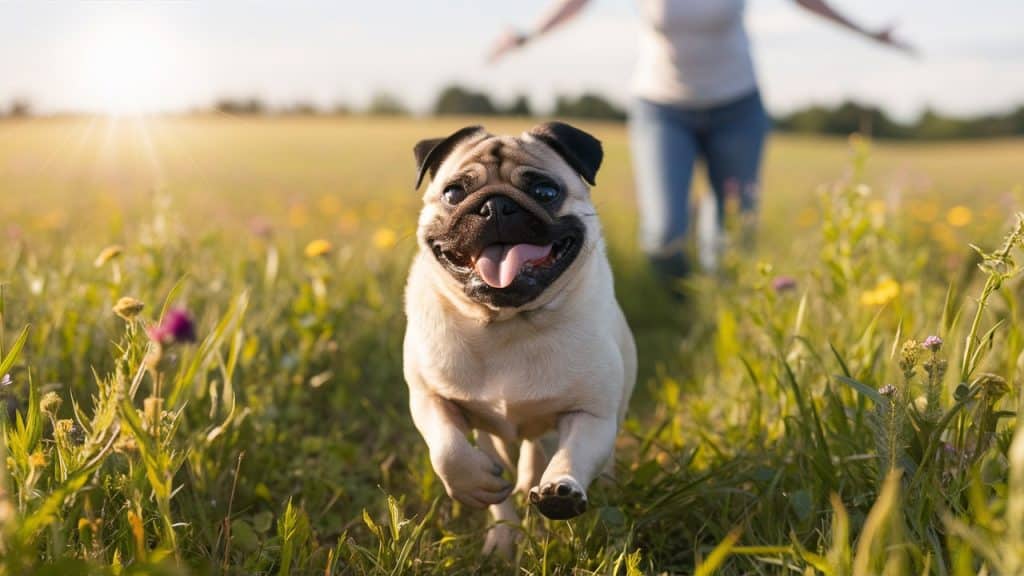
Reading Dog Food Labels: Ingredients and Nutritional Content
Your Pug’s health is greatly influenced by the ingredients in their food. When reading dog food labels, pay attention to the first few ingredients listed – they should be high-quality proteins like chicken or fish. Look for a balance of important nutrients such as omega-3 fatty acids and vitamins for optimal health.
Brand Reputation and Price: What to Look for
Ingredients aren’t the only important factor to consider when choosing the best dog food for your Pug. Brand reputation and price also play a significant role in ensuring you’re getting a high-quality product.
Reputable brands often prioritize using premium ingredients, while price can reflect the overall quality of the food. Aim for a balance between quality and affordability for your furry friend.
What sets top-quality dog food brands apart from the rest is their commitment to sourcing the finest ingredients and maintaining strict quality control measures. While reputable brands may come with a slightly higher price tag, the investment in your Pug’s health and well-being is worth it in the long run.
Online Reviews and Pug Owner Communities
An informed pet owner is a responsible pet owner. Utilize online reviews and engage with Pug owner communities to gather valuable insights and recommendations on the best dog food for Pugs.
Hearing firsthand experiences from other Pug parents can help you make an informed decision that suits your furry companion’s unique needs. Bear in mind, knowledge is power when it comes to providing the best care for your beloved Pug.
Nutritional Requirements for Different Life Stages
Puppies: Fueling Growth and Development
Growth is crucial for Pug puppies, who need the right fuel to support their development. Look for puppy-specific formulas that are rich in protein and crucial nutrients to help them thrive. As they grow, their nutritional needs will change, so it’s crucial to consult your vet to ensure they’re getting the right balance.
Adult Pugs: Maintaining Health and Weight
Fueling adult Pugs with the correct diet is key to maintaining their health and weight. Calorie control and omega-3 fatty acids are crucial for keeping them at a healthy weight and promoting glowing skin. Consider your Pug’s activity level and consult your vet to determine the ideal food for them.
Pugs are prone to skin allergies, so choosing a high-quality, nutrient-rich food can help manage these issues. With the right diet, your adult Pug can lead a long and happy life filled with playtime and joy.
Senior Pugs: Addressing Age-Related Health Issues
Maintaining the health of senior Pugs requires special attention to their age-related health issues. They may have decreased activity levels and metabolism, so selecting a diet that supports joint health and is easy to digest is crucial. Your vet can provide personalized recommendations to ensure your senior Pug stays healthy and happy in their golden years.
It’s important to amend their diet as they grow older to meet their changing needs. Providing them with the right food can make a significant difference in their quality of life and overall well-being.
Common Health Issues in Pugs and How Diet Can Help
Obesity and Weight Management
Obesity can cause some health issues, affecting their quality of life. Choosing a dog food formulated with calorie control can help manage their weight effectively. Additionally, ensuring they get enough exercise is necessary in keeping them fit and happy.
Skin Allergies and Food Sensitivities
To address skin allergies and food sensitivities in Pugs, choosing the right food can make a significant difference. Look for dog food with omega-3 fatty acids, which can help keep their skin healthy and glowing. It’s necessary to consult your vet to determine if any specific ingredients may be triggering allergies in your furry friend.
Common signs of allergies in Pugs include itching, redness, and hot spots on their skin. By identifying and eliminating potential allergens from their diet, you can help alleviate their discomfort and promote healthier skin.
Respiratory Issues and Brachycephalic Syndrome
Diet plays a crucial role in managing respiratory issues in Pugs, especially due to their brachycephalic (short-snouted) nature. For instance, avoiding foods that can lead to excess weight gain is necessary as obesity can exacerbate breathing problems in these lovable pups.
Additionally, wet food with higher moisture content can be beneficial in keeping their airways moist and reducing the risk of respiratory concerns.
Summing Up
With these considerations in mind, selecting the best dog food for Pugs is vital for their overall well-being and happiness. Note, opt for smaller kibble sizes, calorie-controlled options with omega-3 fatty acids, and consult your vet for personalized recommendations.
Whether you choose kibble, wet food, or a raw diet, prioritize high-quality ingredients and balanced nutrition for your Puggy pal’s optimal health. A nutritious diet is the key to a long, playful life for your beloved Pug. So, choose wisely and watch them thrive with the best dog food for Pugs.
FAQ
What should I consider when choosing the best dog food for Pugs?
When identifying the best dog food for Pugs, it is vital to consider their unique needs. Pugs, with their adorable smooshed faces, require smaller kibble sizes that are easier for them to eat. Look for nutrient-rich food that supports weight management and healthy skin, such as formulations with calorie control and omega-3 fatty acids.
These elements can help your Pug maintain a healthy weight and keep their skin glowing.
What are the different types of dog food options available for Pugs?
There are various dog food options suitable for Pugs, each with its advantages. Kibble is the most common type, known for its convenience and shelf stability. Wet food, with its higher moisture content, can be appealing to some Pugs.
Raw food diets are also gaining popularity, but they require more planning and safe handling practices. Consider your Pug’s preferences and consult with your veterinarian to determine the best option for your furry friend.
How can I ensure that I am choosing the best food for my Pug’s health and happiness?
Selecting the best dog food for Pugs is crucial for their overall well-being. Consult with your veterinarian for personalized recommendations based on factors such as your Pug’s age, health status, and activity level. Look for “veterinarian-recommended” dog food brands that prioritize high-quality ingredients and balanced nutrition.
Additionally, consider factors like brand reputation, price, and carefully reading dog food labels to understand the ingredients and nutritional content. Be mindful of, a nutritious diet is the foundation of a healthy, playful life for your Pug.

